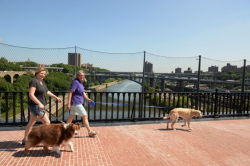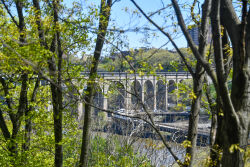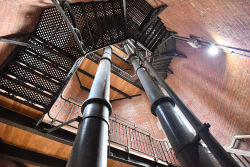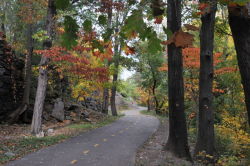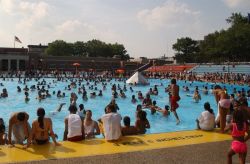Highbridge Park
Highbridge Pool
For outdoor pool details, including hours and rules, please visit our Free Outdoor Pools page.
What was here before?
This rocky precipice remained largely naturalized until converted to public parkland. The site of this recreational facility formerly served as the uptown receiving reservoir, built when the fresh water supply system was first opened in 1848.
How did this site become a pool?
The summer of 1936, deep in the Great Depression, broke local heat records. Highbridge Pool was one of eleven immense outdoor public pools the Parks Department opened that summer. The heroically scaled pools project was financed by the Federal Works Progress Administration (WPA), as part of a massive effort to alleviate adverse health conditions and provide safe recreation in predominantly working-class communities.
The pools were not just huge but also examples of state-of-the-art engineering and fine design. Each pool had separate swimming, diving and wading areas, perimeter bleachers, and bathhouses whose locker rooms served as gyms during non-summer months. Led by architect Aymar Embury II and landscape architect Gilmore D. Clarke, the planning team produced a series of distinct complexes, each one sensitive to its site and topography. Massive filtration systems, heating units, and even underwater lighting provided a more controlled bathing experience than the often treacherous and polluted waterways in which the City’s masses had traditionally swum. The palette of pools building materials was mainly inexpensive brick, concrete and cast stone, but the styles ranged from Romanesque Revival to Art Deco.
Highbridge Pool, measuring 220 by 165 feet, was designed to accommodate 4,880 bathers at a time and its footprint largely conforms to that of the old receiving reservoir. It opened July 14, 1936 and for decades has served patrons of Washington Heights and University Heights across the Harlem River. In 2007, the facility was designated an official New York City landmark.
What is this pool named for?
The pool, like the park, takes its name from the nearby Romanesque stone High Bridge that connected the aqueduct across the river. The surviving tower in the park was once used to create water pressure for upper Manhattan.
Check out your park's Vital Signs
Clean & Safe
Green & Resilient
Empowered & Engaged Users
Share your feedback or learn more about how this park is part of a
Vital Park System



